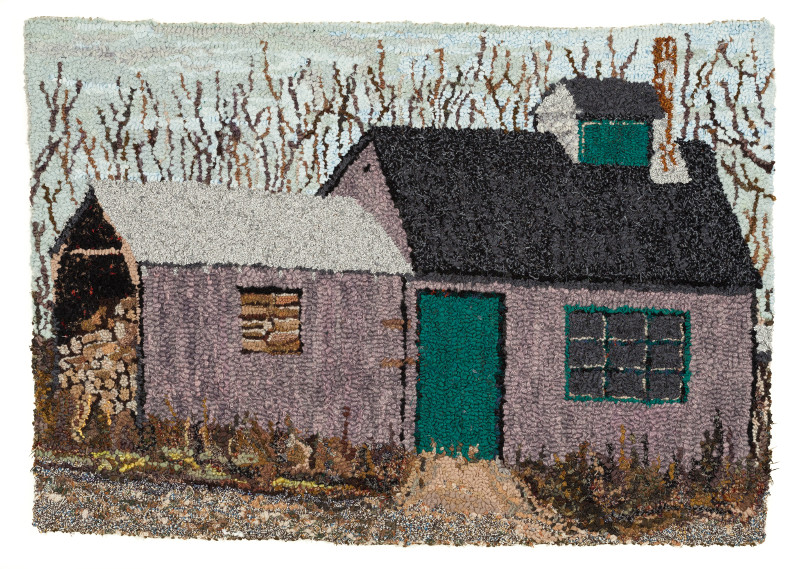I felt the car sink up to its axles in the soft ground. Damn! The winds whipped heavy snow about my face. Large wet flakes settled and clung to my eyelashes, making it harder to assess my predicament, but the plummeting temperature meant I had to extract my little red Datsun before I rested or she’d be frozen in by morning. As my two little boys slept blissfully under a blanket on the back seat of the car, I stood alone in the storm feeling panic grow by the second.
Some months before, the three of us had been abandoned by the boys’ father. I was now farmer, farmer’s wife, mother and father on a farm that demanded the efforts of two grown adults. I was doing okay, for the most part. Young and strong, I’d plunged into my responsibilities with a fervour. Dave was eight and Pete only six; I could not let them suffer the scars of divorce. But Dave had come to me one evening as I gazed out the kitchen window at the ten cord of wood that was yet to be cut and split. I had no money to hire somebody; winter was hard on my heels. I considered all the ominous tasks that I had to complete alone: clearing snow, barn chores, hauling water for the cows across ice and snow, bringing two-foot logs into the house, cleaning the furnace pipes—all on top of my normal chores and a full time job. “Don’t worry Mum,” Dave said. “Pete and me stacked up together, we’ll make a man.”
“I know you will,” I replied. But did I?
Between chores, we filled blank spots in our time with concerts, movies, plays—anything that provided the maximum entertainment for the least amount of our precious money. We even managed one afternoon in Halifax with the Harlem Globetrotters. On that particular stormy night in late November, we had just returned from a puppet show, Aladdin, performed at the Bridgewater High School. The skies were overcast with a nip in the air when we’d left in the late afternoon. We emerged from the school into a raging storm—heavy, wet snow that accumulated fast. I struck out for home with my fingers crossed, hoping I could keep my car on the roads, most of which were narrow and rutted. Snow spiralled towards the windscreen as I fought the hypnosis it intended. Standard shift, front wheel drive and a homing instinct got us back to our empty farmhouse. I drove as close as I could to the house and woke the boys. But as they stirred from their blanket, the car settled into the earth.
“Boys! Wake up! Get into the house and straight to bed. I’ll be in soon to light the furnace.”
Or so I hoped. We had been gone for hours. The fires would be out and our poorly insulated house cold. My little boys ploughed their way to the front door as I made for the barn to collect boards and hay. The milk cow softly lowed a greeting which soothed the rough edges of my nerves. My “fancy” boots and nicer slacks were not designed to keep out the chill but I didn’t notice as I scraped away ice and dirt from behind the tires. The snow fell as fast as I could clear it. Such futility merely increased my frantic efforts. Before I dared face how I might push and drive the car at the same time, the front porch light went on. There was Pete, dressed sensibly in his overalls and big rubber boots, plodding through the drifts towards me.
“Pete, you should be warm in your bed,” I said, relieved to see someone, anyone. The countryside was asleep, as we should have been.
“I can’t leave you out here all alone, Mum,” he said.
“Okay,” I managed to get past the lump in my throat. “Can you drive while I push?”
“Yep,” he answered. I gave him a quick lesson on how to use the clutch. It was close to midnight and we could barely see two feet in front of our faces. The snowflakes were smaller but thicker, indicating a drop in temperature and an intensifying storm.
“I call forward or reverse, okay? The trick is to avoid running me over.”
“Yep,” he said again and hopped in behind the wheel.
“Reverse!” I screamed against the wind. My feet, searching for traction, found a rut that stopped them slipping. I pushed. She moved—not much, but she moved. I looked up to signal to my son. He had disappeared from view! On closer inspection, I found him stretched out under the steering wheel with his rubber boots firmly on the clutch and the brake, awaiting instructions.
“We’ll try reverse again,” I called, unable to decide if I should laugh or cry. Backwards, forwards, backwards, forwards, while I pushed with all I had. Pete got it right every time and suddenly the struggling car popped out of the muck. I ran to jump in. Pete scooted over and I moved the Datsun onto more solid ground. We had done it! We had done it!
I hugged my little man, for man he was. We put away the tools and headed for the house. Warmth welcomed us in. Somebody had lit the fires. I looked at Pete, who answered with a wry grin and wee shrug. What could I say? Stacked up together? I had my answer that stormy night.


